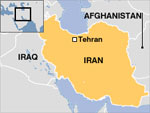 AP: Tehran’s chief prosecutor said Friday it was only a matter of time before opposition leaders are put on trial for the unrest following the disputed 2009 presidential election, the latest sign that Iranian authorities may make a potentially explosive escalation of their crackdown.
AP: Tehran’s chief prosecutor said Friday it was only a matter of time before opposition leaders are put on trial for the unrest following the disputed 2009 presidential election, the latest sign that Iranian authorities may make a potentially explosive escalation of their crackdown.
The Associated Press
By ALI AKBAR DAREINI
 TEHRAN, Iran (AP) – Tehran’s chief prosecutor said Friday it was only a matter of time before opposition leaders are put on trial for the unrest following the disputed 2009 presidential election, the latest sign that Iranian authorities may make a potentially explosive escalation of their crackdown.
TEHRAN, Iran (AP) – Tehran’s chief prosecutor said Friday it was only a matter of time before opposition leaders are put on trial for the unrest following the disputed 2009 presidential election, the latest sign that Iranian authorities may make a potentially explosive escalation of their crackdown.
Hundreds of opposition supporters have been arrested and tried in the fierce crackdown that crushed opposition protests in the wake of the election, which the opposition claimed hard-line President Mahmoud Ahmadinejad won by fraud.
So far, authorities have stopped short of trying to jail the reform movement’s top leaders – Mir Hossein Mousavi, who claims to have been the real victor in the election, fellow candidate Mahdi Karroubi and former President Mohammad Khatami – apparently out of concern it could spark a new wave of protests and fuel the opposition.
But a series of recent public warnings by hard-liners that they could be tried may be a sign that Iran’s Islamic clerical leadership believes the opposition has been sufficiently suppressed that their arrest would not bring a significant backlash.
On Friday, Tehran prosecutor Abbas Jafari Dowlatabadi told worshippers at Tehran University that the opposition leaders are criminals who sought to topple the ruling Islamic system through street protests.
“We’ve said many times … that leaders of sedition are criminals and charges against them will be investigated. That they will stand trial is definite,” Dowlatabadi said in his address, broadcast live on state radio.
“They (opposition leaders) undermined public trust in the system … and disrupted security in the country. Heavy punishment awaits them,” Dowlatabadi said. “But since their backing is connected to the dirty hands of the U.S. and the Zionists, we need to handle the case with more care.”
The repeated warnings may have a double aim – to discredit the opposition leaders as criminals in the eyes of the public and to test the waters to see if their arrest would prompt a new wave of protests. Mousavi, Karroubi and Khatami are already barred from leaving the country. Though no travel ban had been officially announced, Khatami was forbidden to travel to Japan in April to attend a conference on dialogue between cultures.
Mousavi and Karroubi said earlier this month that they are already living in a “big prison” and didn’t care if they were put behind bars in a “small prison” for defending the trampled rights of the Iranian nation. Mousavi recently likened Iran’s ruling system to a North Korean style dictatorship with a few cosmetic democratic gestures and criticized the disputed June 2009 election as a coup against democracy.
Last week, State Prosecutor Gholam Hossein Mohseni Ejehi indicated that the country’s political leadership is debating whether to arrest the three, pointing to “considerations … at the top level.”
“There are considerations about arresting the sedition leaders,” Ejehi told reporters. “Rest assured that should these considerations clear it, we won’t postpone their arrest until tomorrow. I would order the Tehran prosecutor to arrest them before sunset.”
Many other opposition figures who have been convicted were tried on charges of being “mohareb,” or “fighting against God.” The elite Revolutionary Guard, Iran’s most powerful military force which also holds considerable political power, has pushed for the three opposition leaders to be tried on the same charges.
The wave of protests that erupted after the presidential election was the biggest challenge faced by Iran’s clerical leadership since it came to power in the 1979 Islamic Revolution. Hundreds of thousands took to the streets in support of Mousavi, and some powerful clerics sided with the opposition.
But a heavy crackdown by Guard-led forces suppressed the protests, and many in the opposition – from midlevel political figures to street activists, journalists and human rights workers – were arrested. The opposition has not been able to hold a major protest since December 2009.
The opposition says more than 80 demonstrators were killed in the turmoil. The government, which puts the number of confirmed deaths at 30, accuses opposition leaders of being “stooges of the West” and of seeking to topple the ruling system through a “soft revolution” – street protests.


